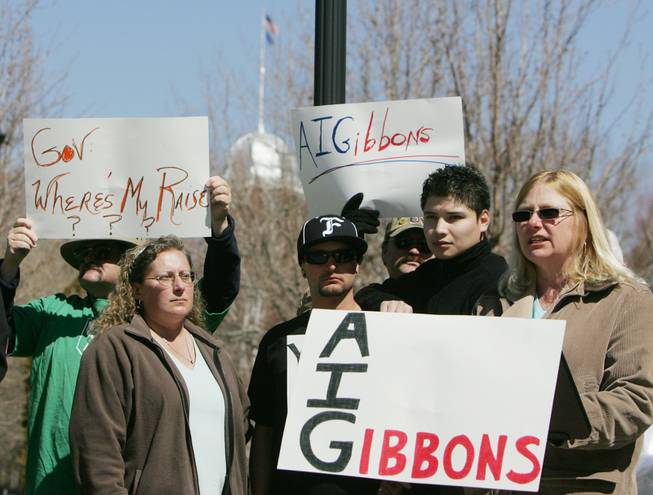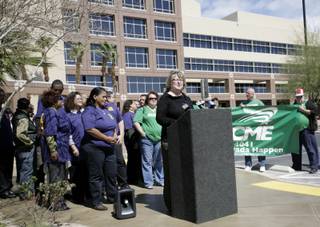
BRAD HORN / NEVADA APPEAL
A group rallies Monday at the Legislature to protest Gov. Jim Gibbons’ salary increases for his staff, which include up to 100 percent raises for some. In defense of the raises at a hearing of the Assembly Ways and Means Committee, the governor’s chief of staff noted that the staff had been reduced from 21 to 16 and that some had taken on additional duties or been promoted.
Tuesday, March 24, 2009 | 2 a.m.
Related story
- Coverage of Monday's Las Vegas rally: Union protests pay raises for Gibbons’ staff
Related stories
- Lawmakers question pay increases for Gibbons’ staff (3-16-2009)
- Shorter workweeks for state workers? Not yet (3-20-2009)
- Accountant: Loux gave nearly 14 percent pay raise (2-13-2009)
- File under: Never waste a crisis (2-13-2009)
- Guinn testifies he never authorized Loux pay increase (2-12-2009)
- State workers rally for 4 percent pay hike (6-27-2008)
Sun archives
The pay increases for Gov. Jim Gibbons’ staff came under attack yet again Monday, this time from Democratic Assembly members.
During a hearing of the Assembly Ways and Means Committee, Sheila Leslie noted there was no documentation to support the raises, which for some positions reached nearly 100 percent in 18 months. For example, the pay of Jodi Stevens, the legislative assistant to the governor, went from $50,196 in January 2007 to $99,994 in April 2008.
“It looks like the salaries were picked out of the air,” Leslie, D-Reno, said.
The 1999 Legislature granted the governor authority to decide how many employees work in the office and to set their salaries, provided the expenditures did not exceed the total amount allocated by lawmakers.
“Just because you have the ability to do it doesn’t make it right,” Assembly Majority Leader John Oceguera, D-Las Vegas, said of the increases.
Leslie said the Legislature might change the law so legislators again set the salaries of the governor’s staff.
Josh Hicks, the governor’s chief of staff, attended the hearing to defend the raises.
The governor’s office staff has been reduced from 21 to 16 employees and returned $173,000 in unspent money for salaries this year. Overall payroll costs have decreased 11 percent, he said.
Any salary increases were due to promotions and the additional responsibilities the remaining workers took on, he said.
Assemblyman Marcus Conklin, D-Las Vegas, complained that among the governor’s cuts was the “constituent services” position in Las Vegas. “There are a lot of people in Las Vegas,” he said.
Hicks said there is still a full-time constituent services employee in Las Vegas.
“We’re dealing with the budget cuts just like every other agency,” he said.
•••
Even with the turmoil in the stock market, the state Public Employees’ Retirement System will continue sending monthly checks to more than 38,000 retired government workers.
Executive Officer Dana Bilyeu told the Senate Government Affairs Committee the system will “not only be able to meet our obligations” but will continue to put more money from the monthly premiums into investments.
For the past year the investments lost 22 percent, but over the past 20 years the return has been a positive 7.6 percent. The system now charges 20.5 percent of the salary of an employee with the payment split between the government and the worker.
Bilyeu said the investment strategy has been “conservative” and the system doesn’t put money in “exotic strategies” or emerging markets. There may be some “impact” on rates in 2011 and 2013 because of the downturn in returns on investments, she said.
The average annual pension for regular government employees is $27,000, and $45,000 for police and firemen.
The presentation came on the same day Gibbons’ recommendations to scale back retirement benefits was introduced in the state Senate. The governor is pushing the recommendations of the Spending and Government Efficiency Commission to cut back existing insurance subsidies for retired state workers by 25 percent in July and another 25 percent in 2010.
Bilyeu said she has not had a chance to review Gibbons’ bill.
•••
Some traffic offenses could get a lot more costly under legislation sponsored by the Senate Energy, Infrastructure and Transportation Committee.
The bill would impose an additional $100 fine against motorists convicted of aggressive driving, reckless driving, driving with a revoked or suspended license, drunken driving, and any felony traffic violation or moving violation that causes death or bodily injury.
The money raised by the additional fine would go to the county, city or town where the offense occurs.


Join the Discussion:
Check this out for a full explanation of our conversion to the LiveFyre commenting system and instructions on how to sign up for an account.
Full comments policy